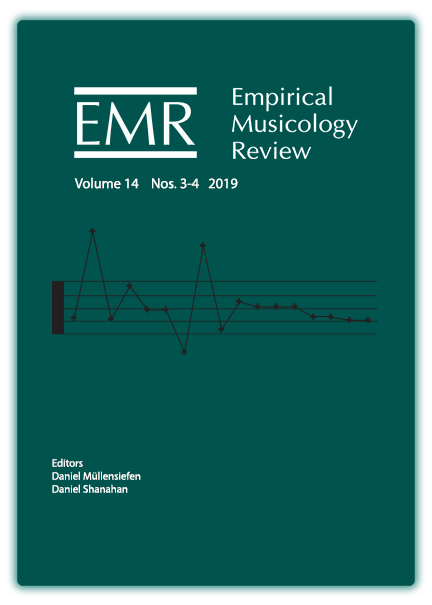Descending Bass Schemata and Negative Emotion in Western Song
DOI:
https://doi.org/10.18061/emr.v14i3-4.6790Keywords:
corpus study, lament, music and emotionAbstract
A descending bass line coordinated with sad lyrics is often described as evoking the "lament" topic—a signal to listeners that grief is being conveyed (Caplin, 2014). In human speech, a similar pattern of pitch declination occurs as air pressure is lost ('t Hart, Collier, & Cohen, 1990) which—coordinated with the premise that sad speech is lower in pitch (Lieberman & Michaels, 1962)—suggests there may be a cognitive-ecological association between descending bass lines and negative emotion more broadly. This study reexamines the relationship between descending bass lines and sadness in songs with lyrics. First, two contrasting repertoires were surveyed: 703 cantata movements by J. S. Bach and 740 popular music songs released ca. 1950–1990. Works featuring descending bass lines were identified and bass lines extracted by computationally parsing scores for bass or the lowest sounding musical line that descends incrementally by step. The corresponding lyrics were then analyzed using the Linguistic Inquiry and Word Count (Pennebaker et al., 2015a, 2015b). Results were not consistent with the hypothesis that descending bass lines are associated with a general negative affect and thus also not specifically with sadness. In a follow-up behavioral study, popular music excerpts featuring a descending bass were evaluated for the features of sad sounds (Huron, Anderson, & Shanahan, 2014) by undergraduate musicians. Here, tempo and articulation, but not interval size as anticipated, were found to be the best predictors of songs with descending bass lines.Published
How to Cite
Issue
Section
License
Copyright (c) 2020 Nicholas Shea

This work is licensed under a Creative Commons Attribution-NonCommercial 4.0 International License.


